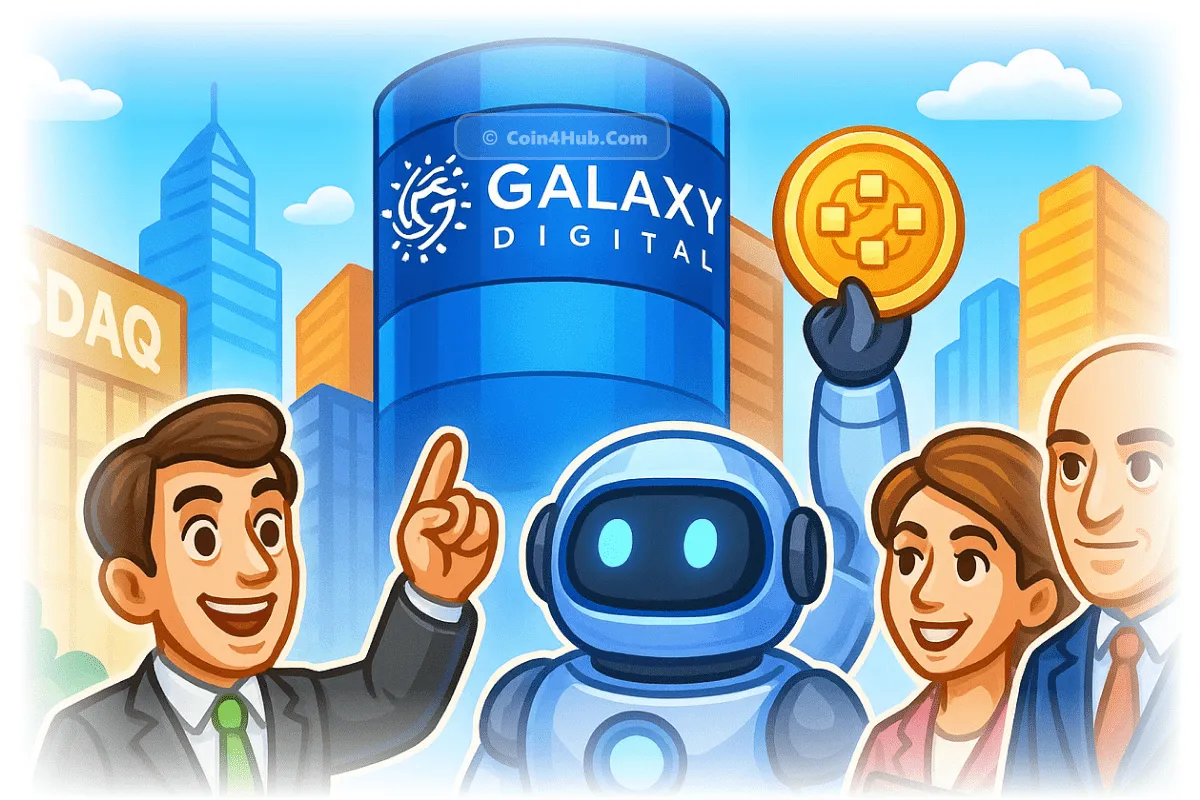Table of Contents
Galaxy Digital, a leading name in the cryptocurrency and blockchain sector, has officially debuted on the Nasdaq stock exchange. This pivotal moment marks a significant milestone for the company, which has long been a bridge between traditional finance and the rapidly evolving crypto ecosystem. The listing, which began on May 16, saw the company’s shares open at $23.50, reflecting both investor confidence and the growing mainstream acceptance of digital assets.
A Long-Awaited Milestone
For Galaxy Digital’s CEO, Mike Novogratz, the Nasdaq listing is the culmination of years of effort. In a statement, Novogratz described the process as both unfair and infuriating, citing regulatory hurdles and market skepticism as major challenges. However, the successful listing underscores the company’s resilience and its ability to navigate the complexities of both traditional and crypto markets.
But the Nasdaq debut is just one part of Galaxy Digital’s ambitious plans. The company is also working closely with the U.S. Securities and Exchange Commission (SEC) to tokenize its shares. This initiative could revolutionize how shares are traded, making them accessible for use in decentralized finance (DeFi) applications such as borrowing and lending.
Tokenization: The Future of Financial Assets?
Tokenization, the process of converting real-world assets into digital tokens on a blockchain, is gaining significant traction in the crypto world. While still a niche market, its potential is immense. According to data from RWA.xyz, the sector’s market cap currently stands at $22.5 billion—a mere fraction of global real-world asset values but growing at an impressive 111.8% over the past year.
Galaxy Digital is at the forefront of this trend, with plans to tokenize not just its shares but also other assets like fixed income and ETFs. This move aligns with a broader industry shift toward making traditional financial instruments more accessible and efficient through blockchain technology.
A Growing Trend Among Crypto Companies
Galaxy Digital is not alone in its pursuit of a U.S. listing under a more favorable regulatory environment. Other prominent crypto companies, including Metaplanet, Circle, Kraken, and Gemini, are also exploring or working on similar initiatives. Trading platform eToro recently completed its listing on May 14, further signaling the growing acceptance of crypto businesses in traditional financial markets.
Despite a challenging first quarter in 2025, where Galaxy Digital reported a $295 million loss, the company’s long-term vision remains intact. With $7 billion in assets on its platform, it continues to be a major player in the crypto infrastructure space.
The SEC’s Role in Tokenization Adoption
The U.S. Securities and Exchange Commission has been a key player in the adoption of tokenized assets. At a crypto roundtable on May 12, SEC Chair Paul Atkins likened the tokenization movement to the music industry’s shift from analog to digital—a transformation that significantly benefited the American economy. This comparison highlights the potential for tokenization to reshape the financial landscape in similarly profound ways.
Galaxy Digital’s collaboration with the SEC is a testament to the growing synergy between regulators and the crypto industry. By working within the regulatory framework, the company aims to set a precedent for how digital assets can coexist with traditional financial systems.
The Broader Implications
The listing of Galaxy Digital on Nasdaq and its plans for tokenized shares represent more than just a corporate milestone. They signify a broader trend of convergence between crypto and traditional finance, offering new opportunities for investors and businesses alike. As more companies explore tokenization and other blockchain-based innovations, the lines between these two worlds will continue to blur.
For Galaxy Digital, the journey is far from over. With its Nasdaq listing and tokenization initiatives, the company is positioning itself as a leader in the next phase of financial evolution. Whether you’re a crypto enthusiast or a traditional investor, these developments are worth watching.
Key Takeaways
- Galaxy Digital successfully debuted on Nasdaq, opening at $23.50 per share.
- The company is collaborating with the SEC to tokenize its shares for use in DeFi applications.
- Tokenization is gaining momentum, with the sector’s market cap growing by 111.8% in the past year.
- Other crypto companies, including Metaplanet and Circle, are also exploring U.S. listings.
- The SEC’s supportive stance on tokenization could accelerate its adoption in traditional finance.
Frequently Asked Questions
What does Galaxy Digital’s Nasdaq listing mean for the crypto industry?
The listing is a significant step toward mainstream acceptance of cryptocurrency and blockchain businesses, bridging the gap between traditional finance and the crypto ecosystem.
How will tokenizing Galaxy Digital’s shares work?
Tokenization involves converting Galaxy Digital’s shares into digital tokens on a blockchain, which can then be used in decentralized finance applications like borrowing and lending.
What is the current state of the tokenization market?
While still a niche market, tokenization is growing rapidly, with its market cap increasing by 111.8% over the past year to $22.5 billion.
Are other companies exploring tokenization?
Yes, companies like Robinhood and Galaxy Digital are actively exploring tokenization as a way to make traditional financial assets more accessible and efficient.
What role does the SEC play in tokenization?
The SEC is working with companies like Galaxy Digital to ensure that tokenized assets comply with existing regulatory frameworks, fostering innovation while maintaining market integrity.


Galaxy Digital’s Nasdaq listing and move towards tokenizing shares is a groundbreaking step for integrating DeFi with traditional finance, setting a precedent for future crypto and regulatory collaborations.
Galaxy Digital’s Nasdaq listing coupled with its initiative to tokenize shares demonstrates an innovative blend of traditional finance and modern blockchain technology. This strategic move not only boosts investor confidence but also sets a significant precedent for the integration of decentralized finance within the established financial ecosystem. It’s a pivotal step forward for the sector.
Galaxy Digital’s Nasdaq listing and shift towards tokenized shares is a groundbreaking advancement, potentially setting new standards for the integration of crypto in mainstream finance.
Galaxy Digital’s Nasdaq debut and subsequent plans for tokenized shares underscore a larger trend wherein crypto innovations infuse the traditional financial landscape, promising broader accessibility and market efficiency.